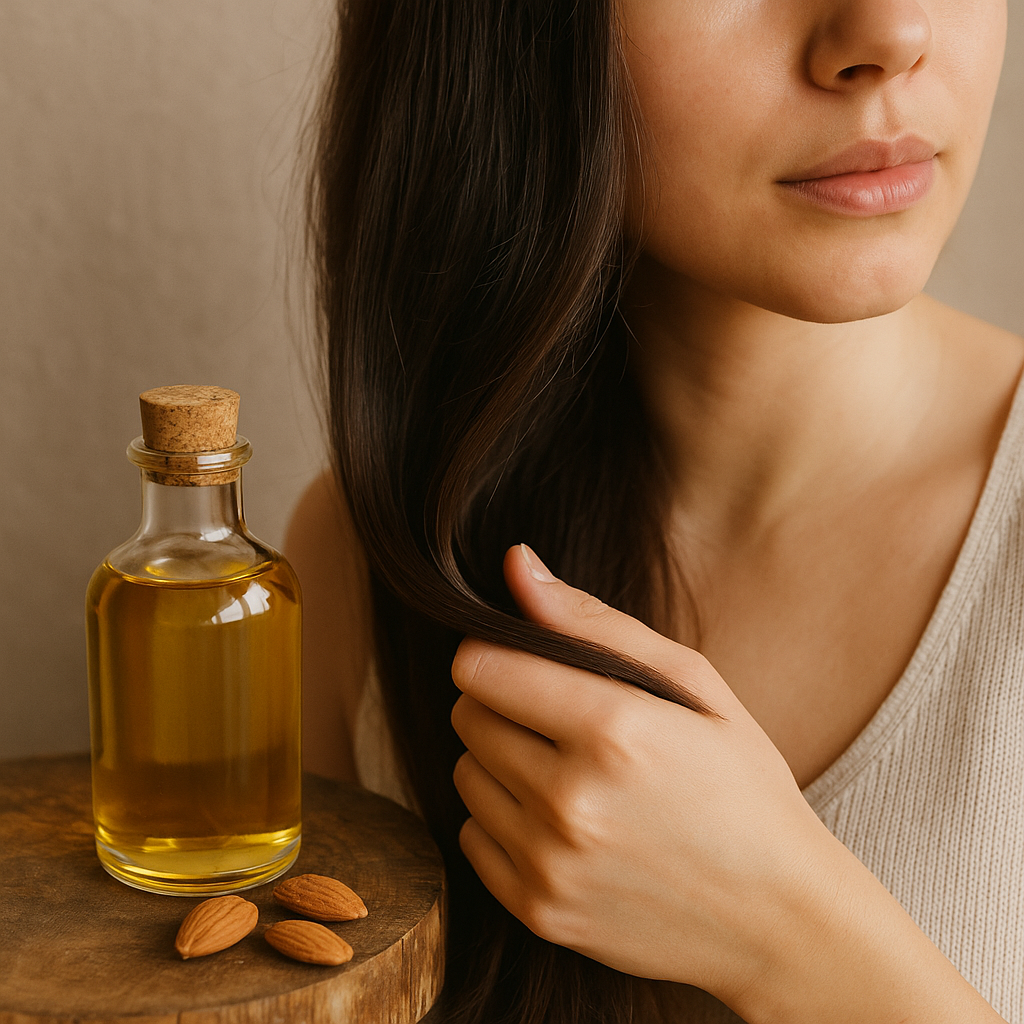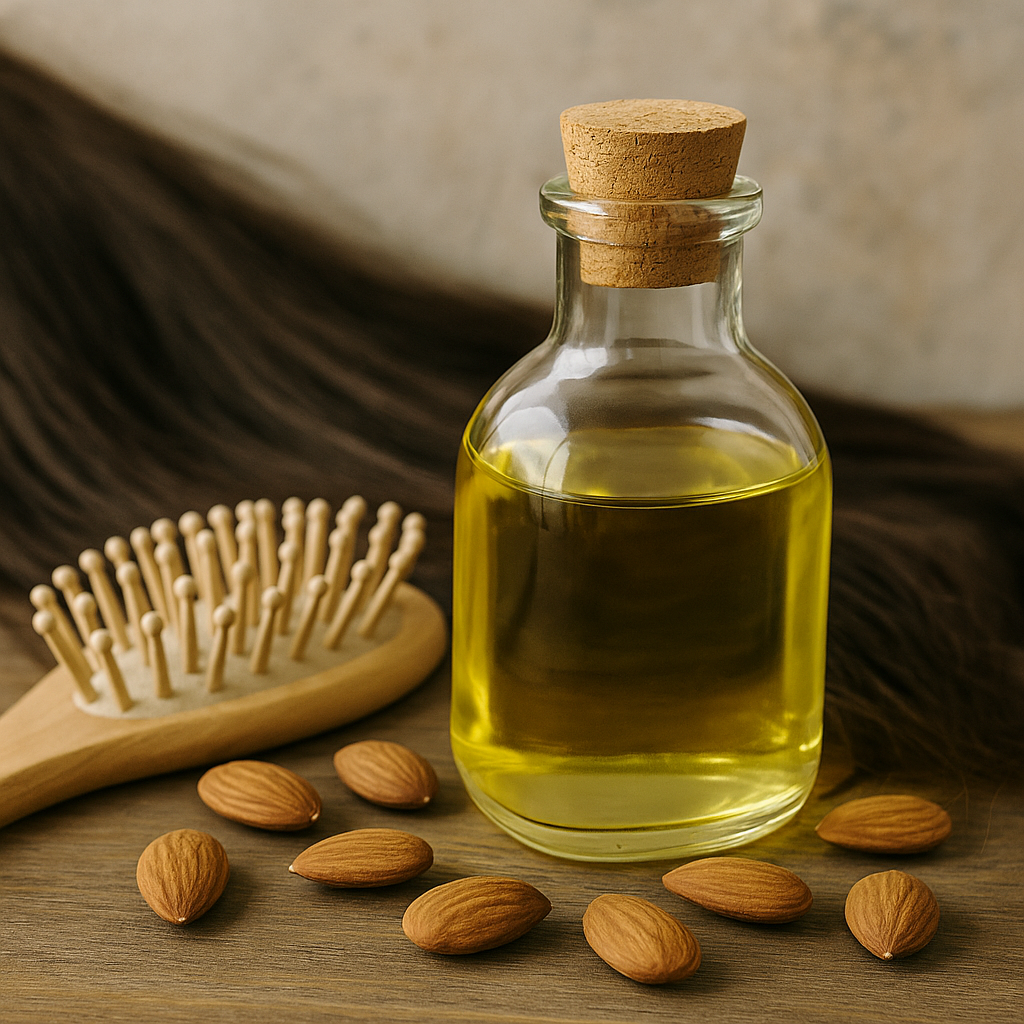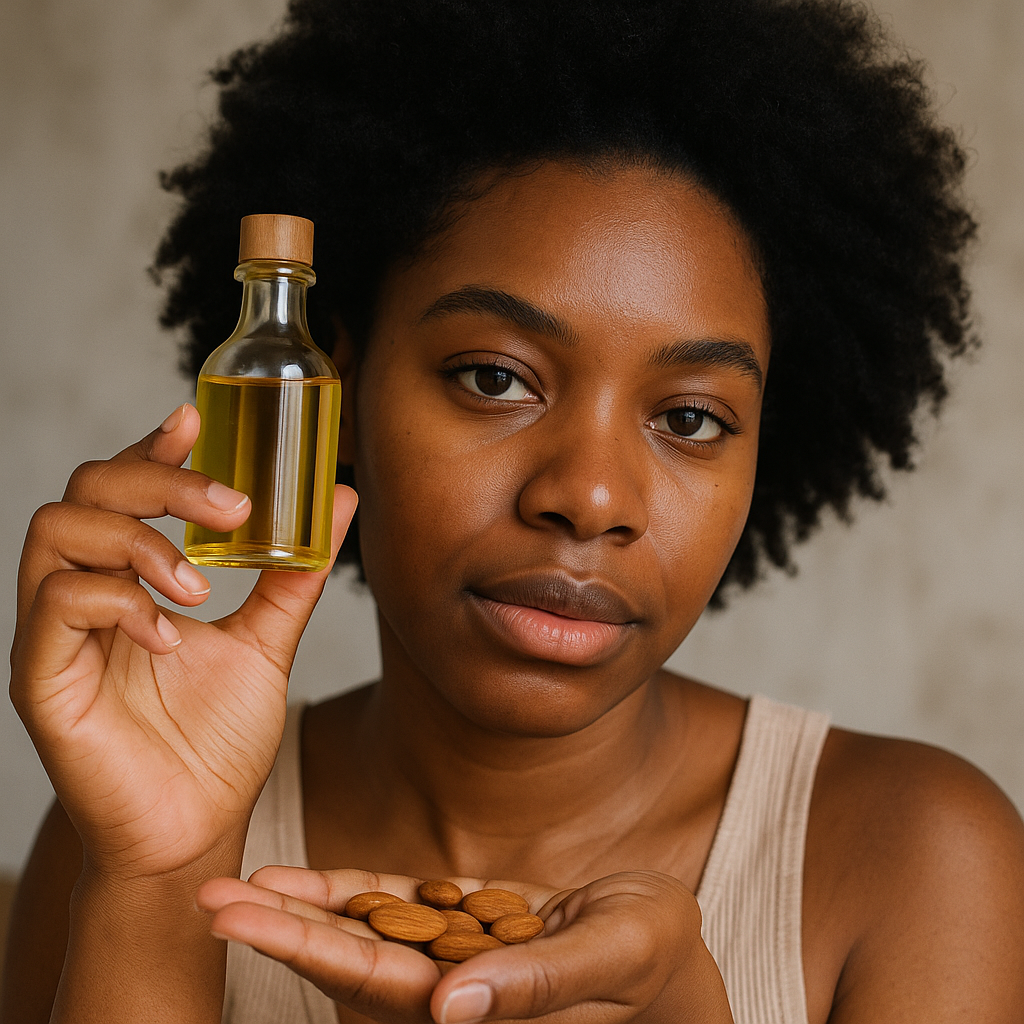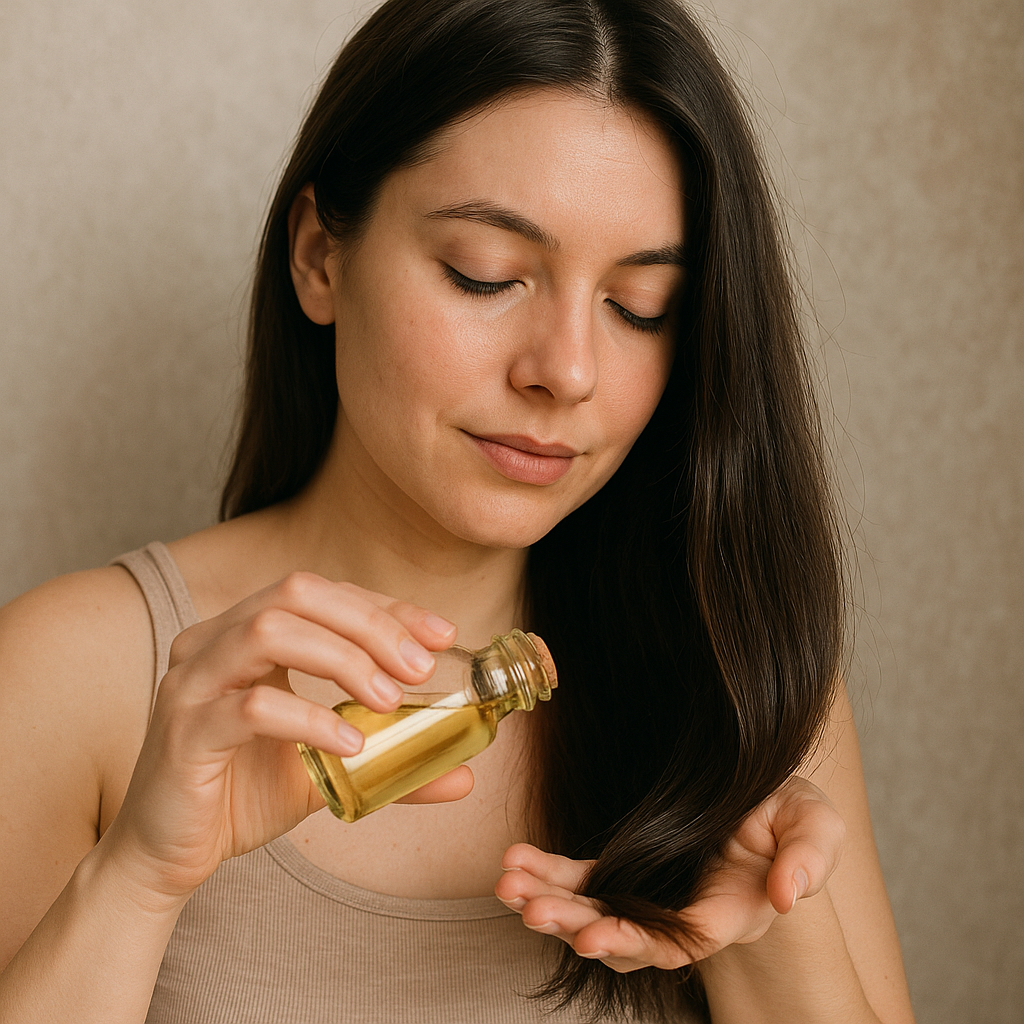Ask Ayurvedic doctor a question and get a consultation online on the problem of your concern in a free or paid mode. More than 2,000 experienced doctors work and wait for your questions on our site and help users to solve their health problems every day.
Can We Use Almond Oil for Hair: Benefits, Growth, and Ayurvedic Insights

For centuries, natural oils have been treasured for their power to nourish and repair hair, but one in particular keeps coming up again and again: almond oil. People often wonder, can we use almond oil for hair? And even more specifically, is almond oil good for hair when it comes to strength, shine, and growth? The answer is yes—when used properly, almond oil can do wonders. From Ayurveda’s ancient wisdom to modern dermatology, the almond oil benefits for hair are praised across cultures. But of course, like with any remedy, knowing the right way to use it—and the potential downsides—makes all the difference.
This article takes a deep dive into the benefits of almond oil for hair, whether it helps with growth, how it works for low porosity hair, and even what side effects you should be aware of. If you’ve ever asked yourself, “Can I use almond oil on my hair everyday?” or “Does almond oil help in hair growth?”—you’re in the right place.

Can We Use Almond Oil for Hair?
Absolutely, yes. Almond oil has been used in beauty traditions for thousands of years, from the Mediterranean to India. Rich in vitamins like E, B7 (biotin), and essential fatty acids, it nourishes both the scalp and strands. Applying almond oil directly onto hair helps reduce dryness, makes detangling easier, and adds a natural shine.
That said, the way you apply it matters. Too much oil without proper washing can leave hair feeling greasy or heavy. On the other hand, light applications—especially on the ends—can keep your hair protected and smooth.
Is Almond Oil Good for Hair According to Ayurveda
Ayurveda, the traditional Indian system of medicine, strongly recommends almond oil for hair care. Known as Vatada taila, it is considered a warming oil that balances Vata dosha. This is why it’s often suggested for brittle, dry, or frizzy hair. Ayurvedic texts highlight its ability to nourish the scalp, strengthen hair roots, and even calm the mind when massaged into the scalp at night.
Can I Use Almond Oil on My Hair Everyday?
This is where things get a little tricky. Technically, yes—you can use almond oil daily if your hair and scalp tolerate it. But realistically, most people don’t need it every single day. Over-oiling can clog pores or make hair appear flat. For many, 2–3 times a week is enough. If your scalp gets oily fast, even once a week might be perfect.

Don't wait or self medicate. Start chat with Doctor NOW
Almond Oil Benefits for Hair
So, what exactly are the benefits of using almond oil on hair? Let’s break it down.
Benefits of Almond Oil for Hair Health and Shine
Almond oil acts like a natural conditioner. Because it’s lightweight yet rich, it smooths down hair cuticles, which reduces frizz and adds shine. It also helps repair split ends when used regularly, though to be clear—it can’t “glue” them back together, but it can prevent them from worsening.
Vitamin E, found abundantly in almond oil, also works as an antioxidant, protecting hair from environmental stressors like pollution and UV rays.
Almond Oil for Low Porosity Hair: How It Works
Low porosity hair has tightly closed cuticles, making it hard for moisture to get in. Interestingly, almond oil is one of the few oils that can still work here, but it needs to be applied in the right way. Warming the oil slightly before application helps it penetrate better. Some people mix it with lighter oils or aloe vera to improve absorption.
Almond Oil for Hair Growth
One of the biggest reasons people turn to almond oil is the hope of longer, fuller hair.
Does Almond Oil Help Hair Growth?
Yes—indirectly. Almond oil is not a magic potion that makes hair sprout overnight, but it creates the right environment for growth. A nourished scalp with fewer breakages means hair can grow longer and healthier. Biotin in almond oil also supports keratin production, which strengthens hair strands.
Is Almond Oil Good for Hair Growth in Ayurveda
Ayurveda views hair growth as a reflection of overall health. By balancing doshas and improving scalp circulation, almond oil massage is believed to stimulate follicles and support stronger, thicker hair. Combined with herbs like amla or bhringraj, almond oil is often part of Ayurvedic hair tonics.

How to Use Almond Oil for Hair
The great thing about almond oil is its versatility. Whether you prefer light daily use or a deep overnight treatment, there’s a method that can fit into your hair routine.
Almond Oil Uses for Hair in Daily Care
For day-to-day use, just a few drops are enough. Rub the oil between your palms and apply it to the mid-lengths and ends of your hair. This works like a leave-in conditioner, adding shine and reducing frizz. People with curly or textured hair especially find it useful, since it helps with detangling and defines curls without weighing them down.
If you’re battling dryness, you can also add a few drops of almond oil into your regular conditioner. This little tweak gives your hair an extra moisture boost without making it greasy.
Ayurvedic Almond Oil Hair Massage Techniques
One of the oldest and most relaxing ways to use almond oil for hair is through an Ayurvedic scalp massage. Warm the oil slightly (not too hot—just enough to feel cozy on the skin) and massage it into your scalp using circular motions.
The massage itself increases blood circulation, while the almond oil delivers nutrients to the roots. According to Ayurveda, this practice not only supports stronger hair but also helps with stress relief and better sleep. Many Ayurvedic practitioners recommend mixing almond oil with herbal powders like bhringraj or brahmi for extra benefits.
Regular head massage with almond oil is believed to calm the nervous system, reduce hair fall caused by stress, and strengthen the bond between scalp and strands.
Can We Apply Almond Oil on Hair and Leave Overnight?
Yes, you can—but with a few caveats. Leaving almond oil overnight allows it to deeply penetrate and condition your hair. Just make sure to cover your pillow with a towel or wear a shower cap, since oil stains can be stubborn.
However, not everyone’s scalp likes overnight oiling. For some, it can clog pores or even attract dust and dirt. If your scalp tends to be sensitive or acne-prone, it might be better to leave the oil on for 1–2 hours instead and then wash it off.

Possible Side Effects of Almond Oil for Hair
Though almond oil is generally safe, it’s important to know potential drawbacks.
Almond Oil for Hair Side Effects You Should Know
Some people may experience scalp irritation or itching, especially if they’re allergic to nuts. Always do a patch test before applying almond oil liberally. Another possible downside is buildup—using too much oil without proper cleansing can weigh the hair down, making it appear dull or greasy.
Occasionally, almond oil may worsen dandruff if the scalp is already oily and prone to fungal growth. That’s why moderation is key.
Who Should Avoid Using Almond Oil on Hair
If you have a nut allergy, almond oil is obviously not safe. Even external application can trigger allergic reactions. Also, people with very fine, limp hair might find almond oil too heavy. In such cases, lighter oils like argan or jojoba could be better options.
Pregnant or breastfeeding women should consult a healthcare professional before using any oil in large amounts, especially when mixing with Ayurvedic herbs.
Conclusion
So, can we use almond oil for hair? The answer is a clear yes—but with balance and awareness. Almond oil has been trusted for centuries in both modern and Ayurvedic practices because of its nutrient-rich profile. It can help strengthen strands, reduce dryness, add shine, and even create the right environment for hair growth. From everyday frizz control to deep scalp massage, almond oil fits naturally into almost any haircare routine.
But like any remedy, it isn’t perfect for everyone. Some people may notice buildup, while others with nut allergies must avoid it altogether. The key takeaway is to start small, observe how your hair responds, and then adjust your routine accordingly.
If you’ve been wondering things like is almond oil good for hair growth or can I use almond oil on my hair everyday, hopefully this guide has given you a practical, realistic view. At the end of the day, nature has provided us with incredible ingredients, but how we use them makes all the difference.
💡 Tip: Try experimenting with different application methods—overnight soaks, daily light use, or Ayurvedic massages—to see what works best for your hair type.
And of course, don’t forget: healthy hair isn’t just about what you put on it, but also what you eat, how you manage stress, and your overall lifestyle. Almond oil can be one powerful tool, but it’s just one piece of the puzzle.
FAQs
Is almond oil good for low porosity hair?
Yes, but with a few adjustments. Low porosity hair tends to resist moisture because the cuticles are tightly packed. Almond oil, being relatively lightweight compared to heavier oils, can penetrate if warmed slightly before application. Pairing it with steam (like wrapping your head in a warm towel) helps the oil absorb better.
Does almond oil help hair growth?
Almond oil supports hair growth indirectly. It nourishes the scalp, reduces breakage, and strengthens strands, which allows hair to grow longer and healthier. Its biotin content also plays a role in keratin production. While it’s not a miracle “fast growth” solution, consistent use over time can absolutely improve hair length and thickness.
Can almond oil cause side effects on hair?
Yes, though they are uncommon. Some people may develop irritation, itching, or excessive buildup if too much oil is applied without proper washing. Those with nut allergies should completely avoid almond oil to prevent allergic reactions.
Is almond oil good for dandruff?
It depends on the cause of dandruff. If your dandruff is due to dryness, almond oil can help moisturize the scalp and reduce flakes. However, if it’s fungal (caused by excess yeast), almond oil may make it worse since oil can feed yeast growth. In that case, using a medicated dandruff shampoo alongside almond oil treatments is best.
Final Thoughts
Almond oil is one of those natural remedies that feels almost too simple to be effective, yet it’s been trusted for generations because it works. Whether you’re using it to boost shine, manage frizz, or support growth, almond oil has a place in modern hair care routines.
So, the next time someone asks you, “Can we apply almond oil on hair?”—you’ll know exactly what to say. Yes, we can, and when used wisely, the benefits of almond oil for hair make it worth adding to your shelf.
If you found this guide helpful, share it with friends or family who love natural hair care. You never know who might be searching for a simple, effective, and time-tested solution like almond oil.

